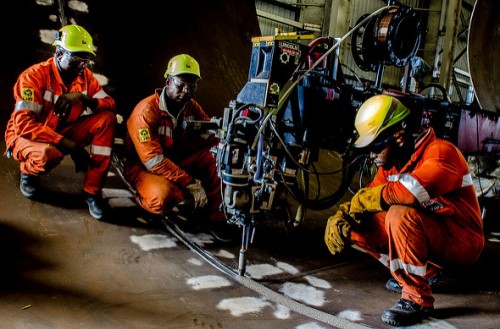Image: Work in the Niger Delta (Cristiano Zingale).
‘Thinking and Working Politically’ (TWP) has been gaining traction in development programming, given its premise that programming teams can maximise the possibility of real impact if they can get the ‘politics’ right. But how much do we really know about what a TWP approach can achieve – and where it might present dangers – in challenging political and sectoral contexts?
In the hope of finding some answers to this question, we have been looking at an innovative, locally-led programme that focuses on the Nigerian oil sector, the Facility for Oil Sector Transparency and Reform (FOSTER). The Nigeria office of the key donor, the UK’s DFID, has a long tradition of experimenting with new approaches. This is grounded in its early work on Drivers of Change, which encourages programme designers to ask themselves a structured set of questions about the dynamics of pro-poor change. Those questions follow on from a single fundamental question: is there a disconnect between a country’s political framework and the operations of its institutions and development agencies?
So when DFID began to think about how to shape assistance to reduce the many incentives for misuse of power and capture of oil revenues in Nigeria, FOSTER became one of the earliest DFID programmes with an explicitly ‘thinking and working politically’ approach. Conceived with learning from Drivers of Change (PDF) in mind, its vision from the outset was remarkably broad and intentionally open.
Our paper examines the first phase, which ran from 2011 to mid-2016. FOSTER’s aims were to support policy reforms in the sector; to strengthen the accountability and competence of actors on both the demand and supply side; and to support efforts to improve monitoring mechanisms and transparency. The aim was to tackle the distortion of Nigeria’s policy and politics through oil revenue capture and perhaps divert those revenues towards accelerated economic and social development.
We looked at five ‘clusters’ of FOSTER interventions, three viewed as successes and two as failures by the FOSTER team themselves, and we asked what drove both success and failure. Our examination of what worked and what didn’t is unusual in the growing literature on TWP-based development programmes, where the focus of research tends to be on success alone.
Initially FOSTER was a relatively traditional technical assistance programme working primarily with government on reforms to legislation and regulations, and building technical capacity. But its flexible design allowed it to change tack as the Jonathan administration, elected in 2010, took control. In particular, faced with the vanishingly slim possibility of working alongside the new administration, the programme was able to pivot towards supporting interventions that promoted demand for reform from civil society. Then, after the election of President Buhari in May 2015 on an explicitly anti-corruption ticket, the programme was able to pivot again towards supporting both demand- and supply-side interventions.
And our findings suggest that FOSTER offers lessons for three aspects of programme implementation: process – the ‘how it’s done’; content – what sort of activities work and which ones don’t; and the politics of interventions, both for external and internal relationships and incentives.
Interestingly, the findings highlight both the pros and cons of a TWP-based approach. To take just one example, it’s fair to say that in designing a programme that did not prescribe which agents would be appropriate partners – leaving those judgements to the locally-led team’s intimate knowledge of the political and sectoral landscape – DFID had a high tolerance for risk. But it was rather more cautious about reputational risk where it seemed possible that FOSTER’s work had potential to undermine UK relationships with Nigeria and threaten broader aid programming in the country. FOSTER and their management team were expected to mitigate these risks.
All this tells us that there may be times when a TWP approach can become more of a challenge than a strength. For the FOSTER initiative, a politically savvy approach delivered success where a more traditional programme design could not have done, particularly when working with the government and its institutions became difficult. Yet once it became possible for the FOSTER team to work with government again, new dangers loomed. What impact might that have on the relationships built with civil society demand-side change agents? And was it possible that the actions of civil society partners might undermine relationships with supply-side government reform champions and institutional partners?
The outcome was a policy of discretion, particularly in the way information researched and disseminated by FOSTER was presented. Branding of publications stopped in the first year of the programme, and there was a shift towards presenting FOSTER as a neutral repository of factual information on the Nigerian oil sector, accessible to any interested party. It was clear, however, that the very flexibility of the programme and its ability to respond to political change by switching horses, so to speak, also opened space for potential damage – and this had to be managed.
It is, we conclude, all about balance. As with any framework, practitioners need to be alert to the possibility that an apparent strength of a TWP approach may also be its weakness – and they should be ready to avert that danger.













